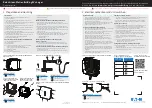
If A Deployment Occurs
The front air bags are designed to deflate immediately after deployment.
NOTE:
Front and/or side air bags will not deploy in all collisions. This does not mean something
is wrong with the air bag system.
If you do have a collision which deploys the air bags, any or all of the following may occur:
• The air bag material may sometimes cause abrasions and/or skin reddening to the
occupants as the air bags deploy and unfold. The abrasions are similar to friction rope
burns or those you might get sliding along a carpet or gymnasium floor. They are not
caused by contact with chemicals. They are not permanent and normally heal quickly.
However, if you haven’t healed significantly within a few days, or if you have any
blistering, see your doctor immediately.
• As the air bags deflate, you may see some smoke-like particles. The particles are a
normal by-product of the process that generates the non-toxic gas used for air bag
inflation. These airborne particles may irritate the skin, eyes, nose, or throat. If you
have skin or eye irritation, rinse the area with cool water. For nose or throat irritation,
move to fresh air. If the irritation continues, see your doctor. If these particles settle on
your clothing, follow the garment manufacturer’s instructions for cleaning.
Do not drive your vehicle after the air bags have deployed. If you are involved in another
collision, the air bags will not be in place to protect you.
WARNING!
Deployed air bags and seat belt pretensioners cannot protect you in another collision.
Have the air bags, seat belt pretensioners, and the seat belt retractor assemblies
replaced by an authorized dealer immediately. Also, have the Occupant Restraint
Controller System serviced as well.
NOTE:
• Air bag covers may not be obvious in the interior trim, but they will open during air bag
deployment.
• After any collision, the vehicle should be taken to an authorized dealer immediately.
Enhanced Accident Response System
In the event of an impact, if the communication network remains intact, and the power
remains intact, depending on the nature of the event, the ORC will determine whether to
have the Enhanced Accident Response System perform the following functions:
• Cut off fuel to the engine.
• Flash hazard lights as long as the battery has power or until the hazard light button is
pressed. The hazard lights can be deactivated by pressing the hazard light button.
• Turn on the interior lights, which remain on as long as the battery has power.
• Unlock the power door locks.
G E T T I N G S T A R T E D
39
Содержание charger 2017
Страница 271: ...NOTES 269 ...
Страница 272: ...NOTES 270 ...
Страница 273: ...NOTES 271 ...
Страница 274: ...NOTES 272 ...
















































